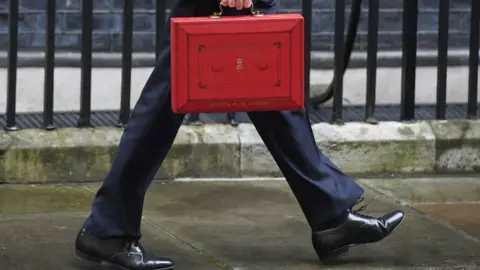Philip Hammond attacks Tory general election campaign
Chancellor Philip Hammond has criticised the way the Conservatives fought the general election campaign, saying there should have been more focus on the economy.
Mr Hammond said he was unhappy with the low-key role he was given and that the Tories should have put more effort into "dismantling" Labour's plans.
He also said the government "heard a message" in the election that people were "weary" of spending cuts.
"We are not deaf," he told the BBC.
The chancellor, who has been calling for Brexit talks to prioritise the economy, also warned that leaving the EU without a deal would be "a very, very bad outcome".
But a deal designed to "punish" the UK would be even worse, he said on BBC One's Andrew Marr show.
Campaign criticism
Despite being one of the most senior members of Theresa May's government, Mr Hammond did not play a leading role in the general election campaign, and it was reported that he faced being replaced.
"It's true that my role [in the campaign] was not the one I would have liked it to be," he said.
He did not comment on his conversations with Mrs May after the election, in which the Conservatives lost their Commons majority.
Mr Hammond said the Tories should have focused more on their record of running Britain's finances.
"The end result is that, in my judgement, we did not talk about the economy as much as we should have done."
Asked how long Mrs May had left in Number 10, Mr Hammond replied: "I think what the country needs now is a period of calm while we get on with the job at hand."
 PA
PAThere have been calls for a change in economic strategy since the election, which Labour fought on an anti-austerity platform.
The Tories are now relying for support on the Democratic Unionist Party, which is committed to lobbying for extra cash for public services in Northern Ireland.
The chancellor said he had already "created more flexibility" by loosening George Osborne's deficit-reduction target.
He said he understood people were tired of the "long slog" of spending cuts, but added: "We have to live within our means, and more borrowing... is not the solution."
He said "we have never said we won't raise some taxes", but added that overall the government wanted to keep them low.
The government's plan remained to clear the deficit by the middle of the next Parliament "in a way that's sensitive to the needs of the economy", he added.
Brexit questions
On the eve of the start of formal Brexit negotiations, Mr Hammond gave a strong warning about the implications of the UK leaving the EU without a deal in place.
Mrs May has refused to rule out this scenario, saying repeatedly that "no deal is better than a bad deal".
Mr Hammond said having no deal would be "a very, very bad outcome for Britain" but added that he would not agree to one that aimed to "suck the lifeblood out of our economy over a period of time".
Businesses have warned of damaging tariffs being imposed on their products unless new trade arrangements are agreed.
Mr Hammond also said the UK would definitely be leaving both the EU single market and the customs union, but must avoid "cliff edges".
"It's a statement of common sense that if we are going to radically change the way we work together, we need to get there via a slope, not a cliff edge."
The government has previously said it will not stay in the EU-wide single market, as this would mean accepting the free movement of workers, and it wants a free trade deal to be agreed instead.
It also plans to replace its membership of the customs union, which enables tariff-free trading within the EU, with a new arrangement that lets it strike trade deals with the rest of the world.
Also appearing on the Andrew Marr Show, Labour's Brexit spokesman Sir Keir Starmer said Britain could not remain a full member of the single market after leaving the EU but argued for keeping customs union membership "on the table".
He added: "I think the prime minister has got us into a complete mess.
"She's got no mandate here and she's got no authority abroad and the negotiation starts tomorrow."

Deciphering Hammond on Brexit
By BBC business correspondent Joe Lynam
If you're in the business of reading tea leaves, you'll have your work cut out in trying to decipher what Philip Hammond actually said today.
On the one hand he said that Britain will definitely be quitting the customs union, which will dismay business lobby groups, but the chancellor also hinted that the UK might then want to automatically opt back into Europe's tariff-free trading block.
He said that British exporters should experience trade with the EU "which feels as close as possible to the way it feels now".
Certainly since the general election, employers see a chance for a "softer" Brexit than that outlined in the Lancaster House speech in January by Theresa May.
For the first time in recent memory all five of the biggest business groups (CBI, BCC, IoD, EEF and FSB) have co-signed a letter to Business Secretary Greg Clark in effect pushing for all the benefits of EU membership without being a member.
Squaring that circle might be the political challenge of our generation.
